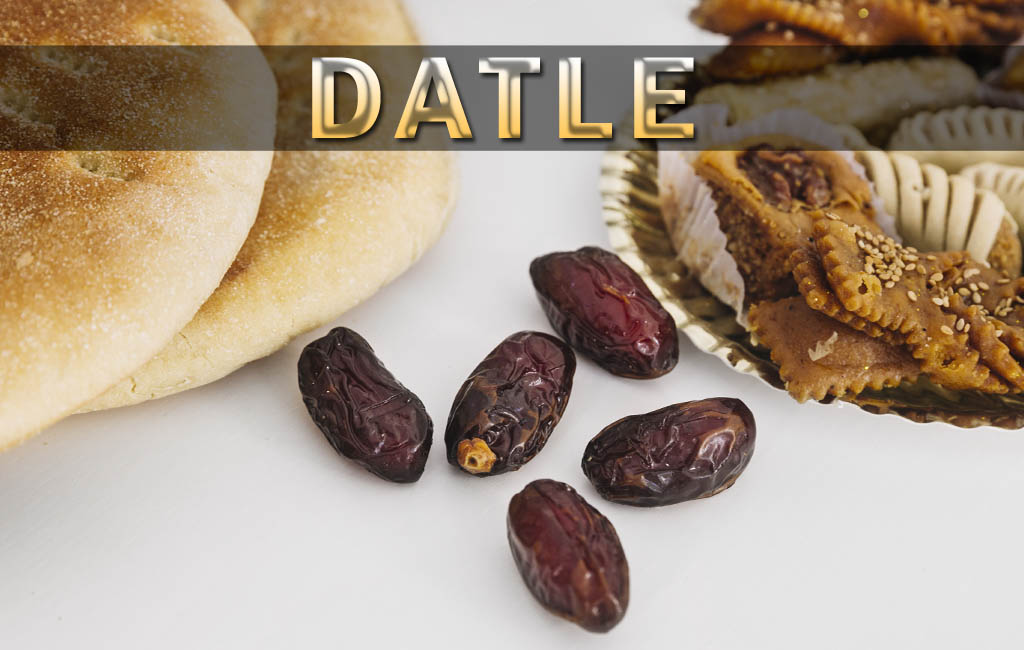What is Datle?
Datle are the edible fruits of the date palm tree (Phoenix dactylifera). They have been cultivated for over 5,000 years, making them one of the oldest cultivated fruits in human history. Originating in the Middle East and North Africa, datle played an essential role in sustaining ancient civilizations. Their natural sugars provided energy for travelers, and their long shelf life made them a valuable trade commodity.
Today, datle are grown in many countries, including Saudi Arabia, Iran, Egypt, and even California in the United States. Varieties such as Medjool, Deglet Noor, and Barhi offer unique textures and flavors, ranging from soft and caramel-like to firm and mildly sweet. Whether eaten fresh or dried, datle are versatile and widely appreciated across cultures.
Nutritional Value of Datle
The nutritional composition of datle makes them a remarkable superfood. They are naturally high in fiber, vitamins, and minerals, while being free from cholesterol and unhealthy fats. A 100-gram serving of datle typically provides:
- Calories: Approximately 277 kcal
- Carbohydrates: 75 g
- Fiber: 7 g
- Protein: 2 g
- Potassium: 696 mg
- Magnesium: 54 mg
- Iron: 0.9 mg
- Vitamin B6: 0.2 mg
The high potassium content supports heart health, while the fiber aids digestion and promotes a feeling of fullness. Datle also contain antioxidants such as flavonoids, carotenoids, and phenolic acid, which protect the body against oxidative stress and inflammation.
Health Benefits of Datle
Datle offer numerous health advantages that make them a valuable addition to any diet. Below are some of the most notable benefits:
1. Digestive Health Support
The rich fiber content in datle supports a healthy digestive system by promoting regular bowel movements and preventing constipation. Fiber also serves as a prebiotic, encouraging the growth of beneficial gut bacteria.
2. Natural Energy Booster
Datle are an excellent source of natural sugars such as glucose, fructose, and sucrose. These sugars provide a quick yet sustained energy release, making datle a perfect snack for athletes, hikers, and anyone needing a mid-day pick-me-up without resorting to processed sweets.
3. Heart Health and Blood Pressure Regulation
The potassium and magnesium found in this fruits play vital roles in maintaining healthy blood pressure levels and supporting heart function. Regular consumption of this fruits, combined with a balanced diet, can contribute to cardiovascular wellness.
4. Antioxidant Protection
Antioxidants in this fruits help fight free radicals, reducing oxidative stress and lowering the risk of chronic diseases. These compounds may support healthy aging and enhance the immune system’s defense mechanisms.
5. Bone Strength and Development
Datle contain minerals like calcium, phosphorus, and magnesium, all essential for maintaining strong bones and preventing conditions such as osteoporosis.
Culinary Uses of Datle
Datle’s natural sweetness and chewy texture make them a versatile ingredient in both traditional and modern cuisines. Here are some popular ways to enjoy this fruits:
- Snacking: Eat them as they are for a healthy, on-the-go treat.
- Stuffed Datle: Fill them with almonds, walnuts, or cream cheese for a gourmet appetizer.
- Baking: Use chopped datle in breads, muffins, or cookies for added sweetness and moisture.
- Energy Bars: Blend this fruits with nuts and seeds to create homemade energy bars or protein bites.
- Natural Sweetener: Puree datle into a paste to replace refined sugar in smoothies, sauces, or desserts.
In Middle Eastern cuisines, this fruits are often paired with coffee or used in festive dishes during Ramadan and Eid. In Western kitchens, they have become a favorite ingredient in vegan and health-conscious recipes.
How to Choose and Store Datle
When selecting datle, look for fruits that are plump, shiny, and free from mold or excessive crystallization. Fresh datle should feel slightly soft but not mushy, while dried varieties should be firm and chewy.
To store datle properly, keep them in an airtight container in a cool, dry place. For extended freshness, you can refrigerate or freeze them, ensuring they remain flavorful for months.
Potential Side Effects and Precautions
While this fruits are generally safe for most people, moderation is key. Because they are high in natural sugars, excessive consumption may contribute to weight gain or blood sugar spikes in individuals with diabetes. Additionally, some people may be allergic to dates or experience digestive discomfort if consumed in large quantities.
It’s always advisable to consult a healthcare professional if you have any underlying health conditions before making significant changes to your diet.
Sustainable Farming and Datle Production
The cultivation of datle plays an important role in sustainable agriculture in arid regions. Date palms are remarkably resilient to harsh desert conditions and can grow where few other crops survive. Farmers often use traditional and eco-friendly irrigation methods to conserve water while maintaining productivity.
Global demand for this fruits has encouraged many producers to invest in organic farming practices and fair-trade certification, ensuring ethical labor practices and minimal environmental impact. By choosing sustainably sourced this fruits, consumers can support local communities and promote environmental stewardship.
Datle in Culture and Tradition
Datle hold deep cultural significance in many parts of the world. In Islamic tradition, they are a symbolic food during Ramadan, where breaking the fast with dates follows the Prophet Muhammad’s practice. In Christianity and Judaism, this fruits are also mentioned in ancient texts, signifying abundance and nourishment.
In modern times, this fruits continue to be a symbol of hospitality and generosity in Middle Eastern households. Offering this fruits to guests is considered a gesture of warmth and friendship.
Conclusion
Datle are much more than a sweet treat—they are a nutrient-rich, versatile, and culturally significant fruit with a history that spans millennia. Packed with fiber, minerals, and antioxidants, datle support digestion, heart health, bone strength, and energy levels. Their ability to replace refined sugar in recipes makes them a natural choice for health-conscious individuals seeking whole-food alternatives.
From traditional dishes to modern health snacks, datle continue to prove their value as a superfood. By choosing high-quality, sustainably sourced datle, you not only enhance your diet but also contribute to ethical and eco-friendly farming practices. Incorporate datle into your meals, and experience the timeless benefits of this extraordinary fruit.
Frequently Asked Questions About Datle
What is datle and where does it come from?
Datle are the sweet, nutrient-rich fruits of the date palm tree, traditionally grown in the Middle East and North Africa.
Is datle good for weight management?
Yes, this fruits can support healthy weight management when eaten in moderation due to its fiber content and natural sweetness that can replace refined sugar.
How can datle be used in cooking?
Datle can be eaten fresh or dried, stuffed with nuts or cheese, blended into smoothies, or used as a natural sweetener in desserts and sauces.
Are this fruits suitable for people with diabetes?
People with diabetes can include this fruits in small portions, but it’s best to consult a healthcare provider as datle contain natural sugars that may affect blood glucose levels.
How should datle be stored for maximum freshness?
Datle should be stored in an airtight container in a cool, dry place or refrigerated to maintain their texture and flavor for months.
What nutrients are found in this fruits?
Datle are rich in fiber, potassium, magnesium, and antioxidants, making them a powerful addition to a balanced diet.
Can children eat datle safely?
Yes, this fruits are safe and healthy for children, but they should be served in small, manageable pieces to avoid choking hazards.
Are there any potential side effects of eating datle?
Excessive consumption of this fruits may cause digestive discomfort or blood sugar spikes in sensitive individuals, so moderation is recommended.
Is datle considered a superfood?
Many nutritionists regard this fruits as a superfood because of its high nutrient density, natural energy boost, and antioxidant content.
Why is this fruits culturally significant in some traditions?
Datle has been a symbol of hospitality and tradition in Middle Eastern cultures and plays a special role during religious celebrations like Ramadan.



